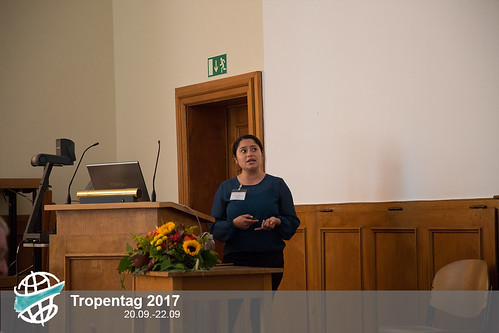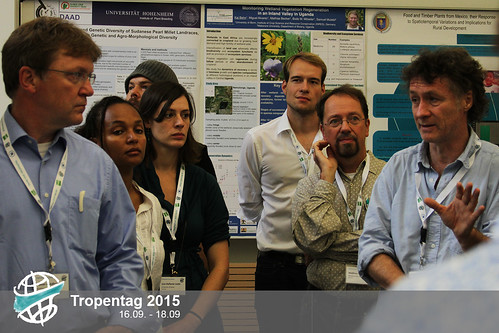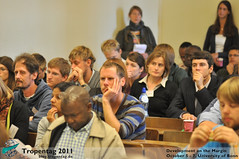climate change
A Changing Environment Changing Lives
Sun, 09/24/2017 - 13:06 — giulia.rotanodariIn many countries, migration is a growing phenomenon because of political, economic and environmental reasons. In the last few decades, sudden or long-term changes in the environment are further exacerbating the often already precarious conditions in Sub-Saharan Africa, shaping the livelihoods of subsistence farmers in particular. This is shown by a study conducted in Ethiopia by Juliane Groth, from the Helmholtz Centre for Environmental Research (UFZ) during the "Institutions and Livelihood" oral presentation session .
By analyzing the reasons that force rural people to migrate, Groth found that this phenomenon is strongly linked to land degradation and shifts in rainfall seasonality. These are the drivers of the decline in livestock quantity and agricultural production. As a result, farmers are looking for fast growing crop varieties that allow for cultivation in a shortened rainy season.
Groth's study is evidence of the need for global intervention with programs to mitigate the impacts of climate change, especially by working with farmers to develop and introduce faster growing crops.
The Ice is Melting! Perceptions of Climate Change in Peru
Thu, 09/21/2017 - 18:01 — giulia.rotanodari71% of tropical glaciers in South America are found in Peru and the ongoing increase in the average global temperature is causing their retreat in many areas, threatening livelihoods.
Yaremi Karina Cruz Rivera, from Cologne University of Applied Sciences, analyzed the perceptions of climate change of four communities living in the surrounding area of the Chicon glacier, one of the highest tropical glaciers in Peru, and the source of water for the Chicon Watershed. The four communities make use of the water in this area for human consumption and agriculture.

The aim of the investigation was to assess the awareness of the communities, in particular of women, of the hazards linked to climate change. Results showed that people perceive that temperatures are increased and extreme climactic events such as droughts, floods and frosts have occurred frequently in the last decade, but drought is the most imminent challenge.
The four communities demonstrated an awareness of the threat of climactic change to agriculture and their livelihoods, leading to an interest in implementing activities and ecological approaches, such as afforestation in the watershed together with the local government.
Indigenous Vegetables, Rubber, Manure and Much More....
Thu, 09/17/2015 - 13:04 — Suzanne Myada One of the highlights of this year's Tropentag is the introduction of the elevator pitch. This refers to a short summary that can be delivered in the time span of an elevator ride. During the guided poster session "Climate change, Carbon Sequestration and Greenhouse Gases" presenters were allowed to speak for only two minutes.
Continue after this pitch :)
One of the highlights of this year's Tropentag is the introduction of the elevator pitch. This refers to a short summary that can be delivered in the time span of an elevator ride. During the guided poster session "Climate change, Carbon Sequestration and Greenhouse Gases" presenters were allowed to speak for only two minutes.
Continue after this pitch :)
When will we Discuss “Bridging Gaps” between Research and Practice? Reflections from the Conference Introductions
Thu, 09/18/2014 - 12:16 — Helen SitarConsider climate change in cultivar selection
Thu, 09/20/2012 - 19:05 — De-Registered User Eike Luedeling
Temperate fruit trees need winter chill in order to produce fruits. The climatic requirements during the dormancy season are poorly understood. With raising temperature production is at risk. Adaptation planning is needed in order to maintain the production.
Eike Luedeling emphasizes the need for long-term adaptation strategies. He promotes the use of the dynamic model to consider climate change in cultivar selection and to find climate analogues.
Eike Luedeling
Temperate fruit trees need winter chill in order to produce fruits. The climatic requirements during the dormancy season are poorly understood. With raising temperature production is at risk. Adaptation planning is needed in order to maintain the production.
Eike Luedeling emphasizes the need for long-term adaptation strategies. He promotes the use of the dynamic model to consider climate change in cultivar selection and to find climate analogues. Stuck under the Weather
Wed, 10/19/2011 - 10:10 — De-Registered UserClimate Change: still getting hot!
Fri, 10/07/2011 - 12:45 — De-Registered User Nowadays, discussions about climate change are almost a guaranteed part of any scientific or academic forum. Tropentag 2011 is no exception. It is not only that climate change had one thematic session and two posters sessions dedicated to it, but the topic was constantly mentioned in other sessions such as Food Security, Ecosystem Services, Soil Fertility, Crop Production, Water and Irrigation, and Forests. I am not implying that climate change is THE ISSUE, but it seems clear that it was one of the key issues connecting the theme of marginality.
If you follow the “whereabouts” of climate change (as I do!), you won’t be surprise to hear that nothing really new came out the Tropentag 2011. Don’t get me wrong, there were lots of useful new data, nice climatic models, experimental results and adaptation activities; but they were in most cases, an improved version of what we saw in previous gatherings dealing with the issue -nothing really new-.
Where the heat comes from?
I was actually surprised to see that during the thematic session, the large lecture room was overflowing with people. It was probably the most attended session apart from the plenary session on Wednesday 6 October, clearly indicating that visitors to Tropentag 2011 considered climate change as one of the hottest issues at the conference.
Nowadays, discussions about climate change are almost a guaranteed part of any scientific or academic forum. Tropentag 2011 is no exception. It is not only that climate change had one thematic session and two posters sessions dedicated to it, but the topic was constantly mentioned in other sessions such as Food Security, Ecosystem Services, Soil Fertility, Crop Production, Water and Irrigation, and Forests. I am not implying that climate change is THE ISSUE, but it seems clear that it was one of the key issues connecting the theme of marginality.
If you follow the “whereabouts” of climate change (as I do!), you won’t be surprise to hear that nothing really new came out the Tropentag 2011. Don’t get me wrong, there were lots of useful new data, nice climatic models, experimental results and adaptation activities; but they were in most cases, an improved version of what we saw in previous gatherings dealing with the issue -nothing really new-.
Where the heat comes from?
I was actually surprised to see that during the thematic session, the large lecture room was overflowing with people. It was probably the most attended session apart from the plenary session on Wednesday 6 October, clearly indicating that visitors to Tropentag 2011 considered climate change as one of the hottest issues at the conference.




